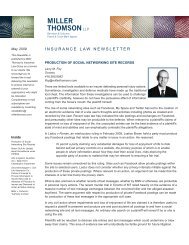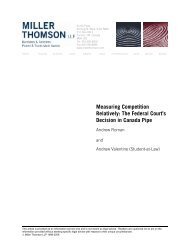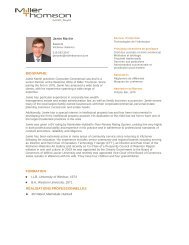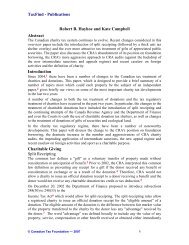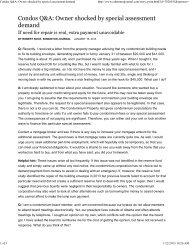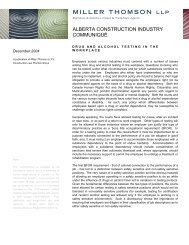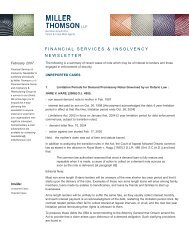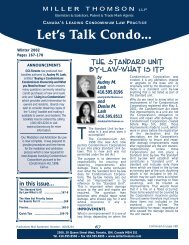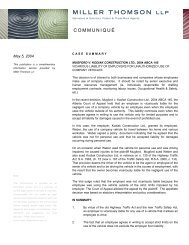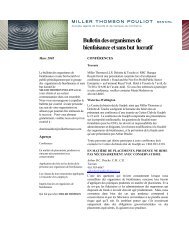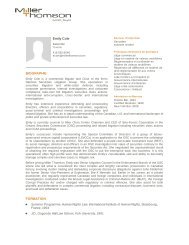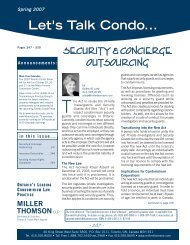"Consent and the Personal Health information ... - Miller Thomson
"Consent and the Personal Health information ... - Miller Thomson
"Consent and the Personal Health information ... - Miller Thomson
You also want an ePaper? Increase the reach of your titles
YUMPU automatically turns print PDFs into web optimized ePapers that Google loves.
–16 –<br />
A HIC must comply with m<strong>and</strong>atory reporting requirements, such as reporting a child in<br />
need of protection under <strong>the</strong> Child <strong>and</strong> Family Services Act <strong>and</strong> reporting communicable<br />
<strong>and</strong> reportable diseases under <strong>the</strong> <strong>Health</strong> Protection <strong>and</strong> Promotion Act<br />
An express instruction may be overridden if a custodian believes on reasonable grounds<br />
that disclosure of PHI is necessary for <strong>the</strong> purpose of eliminating or reducing a significant<br />
risk of serious bodily harm to a person or group of persons 70<br />
A HIC must notify ano<strong>the</strong>r health care provider to whom <strong>the</strong> individual’s PHI has been<br />
disclosed where it is believed that <strong>the</strong> individual has not consented to <strong>the</strong> disclosure of all<br />
PHI that is reasonably necessary for <strong>the</strong> provision of care to <strong>the</strong> individual. Where this is<br />
<strong>the</strong> case, <strong>the</strong> recipient custodian may follow up with <strong>the</strong> individual to seek express<br />
consent 71<br />
There may be occasions where a HIC believes that <strong>the</strong> individual cannot be treated safely due to<br />
insufficient <strong>information</strong>. In <strong>the</strong> interests of patient safety, for example, <strong>the</strong> College of Physicians<br />
<strong>and</strong> Surgeons of Ontario recognizes that a physician may refuse to treat a patient based on lack<br />
of <strong>information</strong>, but only in non-emergency situations. 72 It is incumbent upon a custodian to<br />
ensure that <strong>the</strong> individual is aware of <strong>the</strong> risks associated with “locking”PHI <strong>and</strong> that this may<br />
have an adverse impact upon <strong>the</strong> quality of care provided.<br />
Duties Arising from “Lock Box”Requests<br />
Lock box requests are one of <strong>the</strong> most challenging aspects of PHIPA for many HICs, particularly<br />
in <strong>the</strong> realm of electronic health records. Technology has outpaced regulatory efforts, with <strong>the</strong><br />
effect that many HICs lack <strong>the</strong> technical ability to effectively manage requests to withdraw,<br />
withhold or restrict PHI. Never<strong>the</strong>less, <strong>the</strong> lock box provisions of PHIPA are fully operational<br />
<strong>and</strong> HICs must comply with requests made, subject to <strong>the</strong>ir technical <strong>and</strong> logistical limitations.<br />
The IPC has suggested that compliance with <strong>the</strong> lock-box provisions can be achieved through:<br />
Policies, procedures or manual processes;<br />
Electronic or technological means; or<br />
A combination of policies, procedures or manual processes <strong>and</strong> technological means. 73<br />
There are a number of strategies that a HIC may employ to implement lock box requests <strong>and</strong> to<br />
manage <strong>the</strong> risk. For example, a HIC would be well advised to ensure that any requests to<br />
withhold, withdraw or restrict <strong>the</strong> collection, use or disclosure of PHI be made in writing. Where<br />
<strong>the</strong>re are significant restrictions, <strong>the</strong>re should be a process to explore <strong>the</strong> reasons for <strong>the</strong> request,<br />
discuss <strong>the</strong> implications <strong>and</strong> risks associated with such a decision, <strong>the</strong> limitations of <strong>the</strong> lock-box<br />
provisions, as well as logistical or technical implications of <strong>the</strong> provider in managing <strong>the</strong> request<br />
70 PHIPA, s. 40<br />
71 PHIPA, s. 20(3)<br />
72 The College of Physicians <strong>and</strong> Surgeons of Ontario, Confidentiality of <strong>Personal</strong> <strong>Health</strong> Information, Policy #8-05<br />
73 Supra, note 60 at 3.




